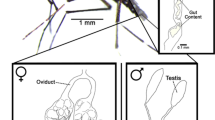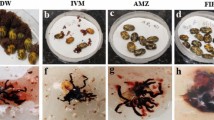Abstract
Inhibitors of apoptosis (IAPs) are regulators of cell death and may play a role in the salivary glands of ticks during blood-feeding. We cloned the open reading frame (ORF) sequence of the IAP gene in Rhipicephalus haemaphysaloides (RhIAP). The RhIAP ORF of 1887 bp encodes a predicted protein of 607 amino acids, which contains three baculovirus IAP repeat domains and a RING finger motif. A real-time PCR assay showed that RhIAP mRNA was expressed in all the tick developmental stages (eggs, larvae, nymphs, and adults) and in all tissues examined (midgut, ovary, salivary glands, fat body, and hemolymph). Western blot showed that the protein level of RhIAP in salivary glands increased during tick blood-feeding and decreased towards the end of tick engorgement. RhIAP gene silencing in vitro experiments with salivary glands demonstrated that RhIAP could be effectively knocked down within 48 h after dsRNA treatment, and as a consequence, salivary glands displayed apoptotic morphology. RhIAP gene silencing also inhibited tick blood-feeding and decreased the engorgement rate. These data suggest that RhIAP might be a suitable RNAi target for tick control.





Similar content being viewed by others
References
Ayllón N et al (2013) Anaplasma phagocytophilum inhibits apoptosis and promotes cytoskeleton rearrangement for infection of tick cells. Infect Immun 81:2415–2425. https://doi.org/10.1128/iai.00194-13
Ayllón N et al (2015) Systems biology of tissue-specific response to Anaplasma phagocytophilum reveals differentiated apoptosis in the tick vector Ixodes scapularis. PLoS Genet 11:e1005120. https://doi.org/10.1371/journal.pgen.1005120
Bhat HR, Naik SV, Ilkal MA, Banerjee K (1978) Transmission of Kyasanur Forest disease virus by Rhipicephalus haemaphysaloides ticks. Acta Virol 22:241–244
Bior AD, Essenberg RC, Sauer JR (2002) Comparison of differentially expressed genes in the salivary glands of male ticks, Amblyomma americanum and Dermacentor andersoni. Insect Biochem Mol Biol 32:645–655. https://doi.org/10.1016/s0965-1748(01)00143-6
Blitvich BJ et al (2002) Developmental- and tissue-specific expression of an inhibitor of apoptosis protein 1 homologue from Aedes triseriatus mosquitoes. Insect Mol Biol 11:431–442. https://doi.org/10.1046/j.1365-2583.2002.00352.x
Bowman AS, Sauer JR (2004) Tick salivary glands: function, physiology and future. Parasitology 129(Suppl):S67–S81. https://doi.org/10.1017/s0031182004006468
Cabezas-Cruz A, Alberdi P, Ayllón N, Valdés JJ, Pierce R, Villar M, de la Fuente J (2016) Anaplasma phagocytophilum increases the levels of histone modifying enzymes to inhibit cell apoptosis and facilitate pathogen infection in the tick vector Ixodes scapularis. Epigenetics 11:303–319. https://doi.org/10.1080/15592294.2016.1163460
Chen Z, Yang X, Bu F, Yang X, Yang X, Liu J (2010) Ticks (Acari: Ixodoidea: Argasidae, Ixodidae) of China. Exp Appl Acarol 51:393–404. https://doi.org/10.1007/s10493-010-9335-2
Clem RJ, Miller LK (1994) Control of programmed cell death by the baculovirus genes p35 and iap. Mol Cell Biol 14:5212–5222. https://doi.org/10.1128/mcb.14.8.5212
Dantas-Torres F, Chomel BB, Otranto D (2012) Ticks and tick-borne diseases: a One Health perspective. Trends Parasitol 28:437–446. https://doi.org/10.1016/j.pt.2012.07.003
de la Fuente J, Estrada-Pena A, Venzal JM, Kocan KM, Sonenshine DE (2008) Overview: ticks as vectors of pathogens that cause disease in humans and animals. Front Biosci 13:6938–6946. https://doi.org/10.2741/3200
Deveraux QL, Reed JC (1999) IAP family proteins–suppressors of apoptosis. Genes Dev 13:239–252. https://doi.org/10.1101/gad.13.3.239
Doumanis J, Quinn L, Richardson H, Kumar S (2001) STRICA, a novel Drosophila melanogaster caspase with an unusual serine/threonine-rich prodomain, interacts with DIAP1 and DIAP2. Cell Death Differ 8:387–394. https://doi.org/10.1038/sj.cdd.4400864
Elmore S (2007) Apoptosis: a review of programmed cell death. Toxicol Pathol 35:495–516. https://doi.org/10.1080/01926230701320337
Fawcett DW, Doxsey S, Büscher G (1981) Salivary gland of the tick vector (R. appendiculatus) of East Coast fever. I. Ultrastructure of the type III acinus. Tissue Cell 13:209–230. https://doi.org/10.1016/0040-8166(81)90002-1
Freitas DR et al (2007) Cell death during preoviposition period in Boophilus microplus tick. Vet Parasitol 144:321–327. https://doi.org/10.1016/j.vetpar.2006.10.017
Gulia-Nuss M et al (2016) Genomic insights into the Ixodes scapularis tick vector of Lyme disease. Nat Commun 7:10507. https://doi.org/10.1038/ncomms10507
Hajdušek O, Síma R, Ayllón N, Jalovecká M, Perner J, de la Fuente J, Kopáček P (2013) Interaction of the tick immune system with transmitted pathogens. Front Cell Infect Microbiol 3:26. https://doi.org/10.3389/fcimb.2013.00026
Hauser HP, Bardroff M, Pyrowolakis G, Jentsch S (1998) A giant ubiquitin-conjugating enzyme related to IAP apoptosis inhibitors. J Cell Biol 141:1415–1422. https://doi.org/10.1083/jcb.141.6.1415
Kocan KM, Blouin E, de la Fuente J (2011) RNA interference in ticks. J vis Exp. https://doi.org/10.3791/2474
Kotál J et al (2015) Modulation of host immunity by tick saliva. J Proteomics 128:58–68. https://doi.org/10.1016/j.jprot.2015.07.005
Kuo CC, Huang CL, Wang HC (2011) Identification of potential hosts and vectors of scrub typhus and tick-borne spotted fever group rickettsiae in eastern Taiwan. Med Vet Entomol 25:169–177. https://doi.org/10.1111/j.1365-2915.2010.00941.x
L’Amoreaux WJ, Junaid L, Trevidi S (2003) Morphological evidence that salivary gland degeneration in the American dog tick, Dermacentor variabilis (Say), involves programmed cell death. Tissue Cell 35:95–99. https://doi.org/10.1016/s0040-8166(02)00109-x
LaCasse EC, Baird S, Korneluk RG, MacKenzie AE (1998) The inhibitors of apoptosis (IAPs) and their emerging role in cancer. Oncogene 17:3247–3259. https://doi.org/10.1038/sj.onc.1202569
Leulier F et al (2006) Systematic in vivo RNAi analysis of putative components of the Drosophila cell death machinery. Cell Death Differ 13:1663–1674. https://doi.org/10.1038/sj.cdd.4401868
Liu Q, Clem RJ (2011) Defining the core apoptosis pathway in the mosquito disease vector Aedes aegypti: the roles of iap1, ark, dronc, and effector caspases. Apoptosis 16:105–113. https://doi.org/10.1007/s10495-010-0558-9
Liu Q et al (2007) Semi-nested PCR detection of Babesia orientalis in its natural hosts Rhipicephalus haemaphysaloides and buffalo. Vet Parasitol 143:260–266. https://doi.org/10.1016/j.vetpar.2006.08.016
Martins LA et al (2020) The intracellular bacterium Rickettsia rickettsii exerts an inhibitory effect on the apoptosis of tick cells. Parasit Vectors 13:603. https://doi.org/10.1186/s13071-020-04477-5
McIlwain DR, Berger T, Mak TW (2015) Caspase functions in cell death and disease. Cold Spring Harb Perspect Biol. https://doi.org/10.1101/cshperspect.a026716
Nijhof AM, Balk JA, Postigo M, Jongejan F (2009) Selection of reference genes for quantitative RT-PCR studies in Rhipicephalus (Boophilus) microplus and Rhipicephalus appendiculatus ticks and determination of the expression profile of Bm86. BMC Mol Biol 10:112. https://doi.org/10.1186/1471-2199-10-112
Nunes ET, Bechara GH, Saito KC, Denardi SE, Oliveira PR, Mathias MI (2005) Morphological, histological, and ultrastructural characterization of degenerating salivary glands in females of the cattle-tick Rhipicephalus (Boophilus) microplus (CANESTRINI, 1887) (Acari: Ixodidae). Micron 36:437–447. https://doi.org/10.1016/j.micron.2005.03.010
Ocampo CB et al (2013) Differential expression of apoptosis related genes in selected strains of Aedes aegypti with different susceptibilities to dengue virus. PLoS ONE 8:e61187. https://doi.org/10.1371/journal.pone.0061187
Pridgeon JW, Zhao L, Becnel JJ, Strickman DA, Clark GG, Linthicum KJ (2008) Topically applied AaeIAP1 double-stranded RNA kills female adults of Aedes aegypti. J Med Entomol 45:414–420. https://doi.org/10.1093/jmedent/45.3.414
Rodrigues TB, Dhandapani RK, Duan JJ, Palli SR (2017) RNA interference in the Asian longhorned beetle: identification of key RNAi genes and reference genes for RT-qPCR. Sci Rep 7:8913. https://doi.org/10.1038/s41598-017-08813-1
Sandu C, Ryoo HD, Steller H (2010) Drosophila IAP antagonists form multimeric complexes to promote cell death. J Cell Biol 190:1039–1052. https://doi.org/10.1083/jcb.201004086
Saraste A, Pulkki K (2000) Morphologic and biochemical hallmarks of apoptosis. Cardiovasc Res 45:528–537. https://doi.org/10.1016/s0008-6363(99)00384-3
Scopinho Furquim KC, Bechara GH, Camargo Mathias MI (2008) Death by apoptosis in salivary glands of females of the tick Rhipicephalus sanguineus (Latreille, 1806) (Acari: Ixodidae). Exp Parasitol 119:152–163. https://doi.org/10.1016/j.exppara.2008.01.021
Severo MS et al (2013) The E3 ubiquitin ligase XIAP restricts Anaplasma phagocytophilum colonization of Ixodes scapularis ticks. J Infect Dis 208:1830–1840. https://doi.org/10.1093/infdis/jit380
Süss J (2011) Tick-borne encephalitis 2010: epidemiology, risk areas, and virus strains in Europe and Asia-an overview. Ticks Tick Borne Dis 2:2–15. https://doi.org/10.1016/j.ttbdis.2010.10.007
Suzuki Y, Takahashi-Niki K, Akagi T, Hashikawa T, Takahashi R (2004) Mitochondrial protease Omi/HtrA2 enhances caspase activation through multiple pathways. Cell Death Differ 11:208–216. https://doi.org/10.1038/sj.cdd.4401343
Wang H, Gort T, Boyle DL, Clem RJ (2012) Effects of manipulating apoptosis on Sindbis virus infection of Aedes aegypti mosquitoes. J Virol 86:6546–6554. https://doi.org/10.1128/jvi.00125-12
Wang F, Gong H, Zhang H, Zhou Y, Cao J, Zhou J (2019) Molecular characterization, tissue-specific expression, and RNA knockdown of the putative heat shock cognate 70 protein from Rhipicephalus haemaphysaloides. Parasitol Res 118:1363–1370. https://doi.org/10.1007/s00436-019-06258-1
Wang Y et al (2020) Initiator and executioner caspases in salivary gland apoptosis of Rhipicephalus haemaphysaloides. Parasit Vectors 13:288. https://doi.org/10.1186/s13071-020-04164-5
Weiss BL, Kaufman WR (2001) The relationship between “critical weight” and 20-hydroxyecdysone in the female ixodid tick, Amblyomma hebraeum. J Insect Physiol 47:1261–1267. https://doi.org/10.1016/s0022-1910(01)00112-3
Yang Y, Fang S, Jensen JP, Weissman AM, Ashwell JD (2000) Ubiquitin protein ligase activity of IAPs and their degradation in proteasomes in response to apoptotic stimuli. Science 288:874–877. https://doi.org/10.1126/science.288.5467.874
Yu X, Gong H, Zhou Y, Zhang H, Cao J, Zhou J (2015) Differential sialotranscriptomes of unfed and fed Rhipicephalus haemaphysaloides, with particular regard to differentially expressed genes of cysteine proteases. Parasit Vectors 8:597. https://doi.org/10.1186/s13071-015-1213-7
Yu X, Zhou Y, Cao J, Zhang H, Gong H, Zhou J (2017) Caspase-1 participates in apoptosis of salivary glands in Rhipicephalus haemaphysaloides. Parasit Vectors 10:225. https://doi.org/10.1186/s13071-017-2161-1
Yuan S, Akey CW (2013) Apoptosome structure, assembly, and procaspase activation. Structure 21:501–515. https://doi.org/10.1016/j.str.2013.02.024
Zhang L, Li L, Zhang G (2011) Gene discovery, comparative analysis and expression profile reveal the complexity of the Crassostrea gigas apoptosis system. Dev Comp Immunol 35:603–610. https://doi.org/10.1016/j.dci.2011.01.005
Zhang Y, Cui J, Zhou Y, Cao J, Gong H, Zhang H, Zhou J (2018) Liposome mediated double-stranded RNA delivery to silence ribosomal protein P0 in the tick Rhipicephalus haemaphysaloides. Ticks Tick Borne Dis 9:638–644. https://doi.org/10.1016/j.ttbdis.2018.01.015
Zhou J, Liao M, Hatta T, Tanaka M, Xuan X, Fujisaki K (2006) Identification of a follistatin-related protein from the tick Haemaphysalis longicornis and its effect on tick oviposition. Gene 372:191–198. https://doi.org/10.1016/j.gene.2005.12.020
Acknowledgements
This work was supported by a grant from The Agricultural Science and Technology Innovation Program (ASTIP) of China (CAAS-XTCX2016011-02).
Author information
Authors and Affiliations
Corresponding author
Ethics declarations
Ethical approval
All experimental procedures were approved by the Institutional Animal Care and Use Committee of Shanghai Veterinary Research Institute and authorized by the Animal Ethical Committee of Shanghai Veterinary Research Institute.
Additional information
Publisher's Note
Springer Nature remains neutral with regard to jurisdictional claims in published maps and institutional affiliations.
Rights and permissions
About this article
Cite this article
Tuerdi, M., Hu, S., Wang, Y. et al. Engorgement of Rhipicephalus haemaphysaloides ticks blocked by silencing a protein inhibitor of apoptosis. Exp Appl Acarol 84, 623–636 (2021). https://doi.org/10.1007/s10493-021-00637-z
Received:
Accepted:
Published:
Issue Date:
DOI: https://doi.org/10.1007/s10493-021-00637-z




